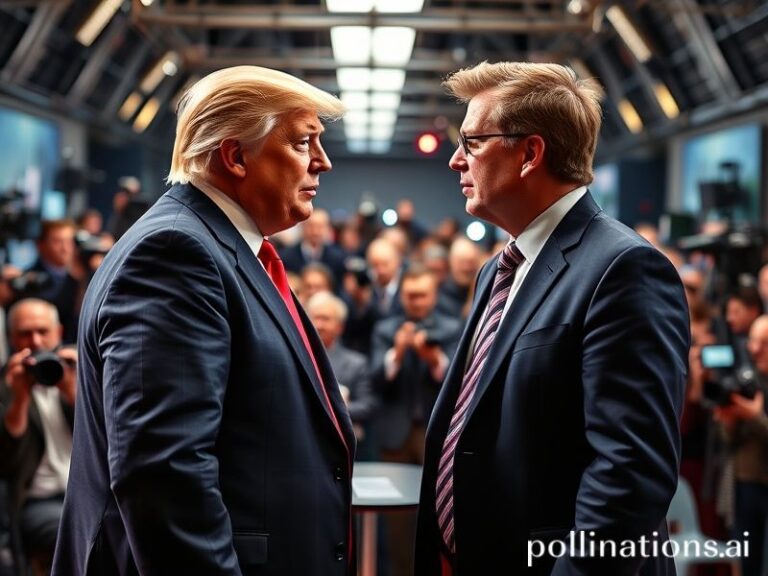tinytan
TinyTan and the Global Shrinking of Attention Spans
By Our Correspondent, Still Recovering from a 7-Second Reel of Existential Dread
SEOUL—Somewhere between the DMZ and the nearest duty-free Bulgogi stand, seven pastel figurines the height of a credit card have become the most efficient diplomats South Korea never hired. TinyTan—BTS reimagined as chibi mercenaries—now storm foreign capitals with plush grenades and heart-shaped ammunition, proving once again that soft power works best when it’s small enough to fit in your pocket and adorable enough to make customs officers forget the word “tariff.”
The figures debuted in 2020, just as the planet discovered that hugging was suddenly lethal and supply chains had all the structural integrity of wet bibimbap. Hybe Corporation, never one to waste a planetary nervous breakdown, rolled out TinyTan like emotional PPE: if you couldn’t attend the concert, the concert would be distilled into a keychain. One year later, the UN used TinyTan avatars to promote its Sustainable Development Goals, because nothing says “end poverty” like a 3-centimeter Jimin in a sparkly cape. The world nodded solemnly, then returned to doom-scrolling.
From Mexico City to Mumbai, TinyTan merch now outsells actual BTS albums in several markets. In Jakarta, counterfeiters crank out unlicensed Jungkook plushies so fast that local authorities stopped busting labs and started auctioning them off—proceeds earmarked for flood defenses, naturally. Meanwhile, French customs officers report a 400-percent spike in undeclared TinyTan shipments, most labeled “religious artifacts.” One could argue the classification is accurate; after all, the figurines perform the minor miracle of extracting twenty-five euros from teenagers who swear they’re broke.
The geopolitical implications are deliciously absurd. Beijing, still technically miffed at Korea for hosting American missile shields, nevertheless granted TinyTan a six-city pop-up tour, provided the characters refrain from wearing anything that could be construed as yellow-ribbon activism. In Washington, senators who can’t spell “K-pop” now lobby for increased Korean semiconductor imports because their kids threatened to filibuster bedtime. And somewhere in Brussels, a Eurocrat is drafting a white paper titled “Micro-Cute Cultural Assets and Their Effect on Trade Balances,” which will be read by exactly four people and ignored by everyone else until it leaks on Reddit.
Of course, the true casualty here is human depth. TinyTan compresses seven actual humans—each with fears, taxes, and occasional existential dread—into bite-sized serotonin pellets. It’s art reduced to algorithm, fandom reduced to frictionless checkout. We used to mail handwritten fan letters; now we drop a pre-chewed emoji and call it devotion. The planet’s average attention span is now eight seconds—one second shorter than the average TinyTan dance-break—yet we wonder why democracy feels like a buffering screen.
Still, one has to admire the brutal efficiency. While traditional diplomacy drones on in mahogany-paneled rooms, TinyTan stages a silent coup of the limbic system. No treaties, no summits, just 0.2 pounds of polyurethane whispering, “You’re valid” in seventeen languages. If that isn’t the future of international relations, then the aliens watching from orbit are in for a very confusing first contact.
Conclusion? Humanity has finally achieved what empires never could: conquest without invasion, tribute without taxation. We hand over our wallets willingly, cooing at pocket-sized idols who promise everything and demand only that we keep scrolling. Tomorrow the figures will be landfill, but today they are talismans against the void—tiny, tan, and utterly, terrifyingly global.







